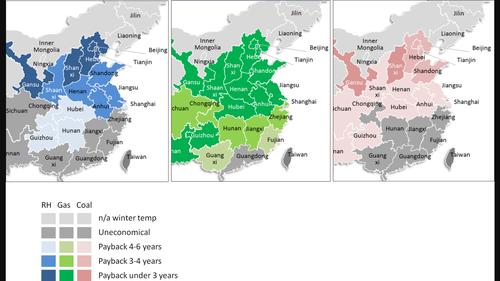中国全县光伏项目与农村热泵应用之间的协同效应
IF 5.4
3区 工程技术
Q2 ENERGY & FUELS
引用次数: 1
摘要
供暖电气化,特别是高效热泵,越来越被视为实现《巴黎气候协定》目标的必要条件。中国已在农村地区推动替代污染严重的燃煤供暖。最近,中国也开始推动分布式太阳能光伏(PV)能源作为农村发展战略,特别是在2021年启动了全县光伏试点项目。虽然有几项研究调查了采用热泵的经济性,无论是否使用太阳能光伏,但整个县的光伏计划尚未得到专门研究。此外,许多先前的研究利用月平均太阳能产量或温度范围。本研究考察了参与全县光伏项目的县的热泵经济性,采用了参与县的每小时光伏输出和环境温度数据。分析表明,在山东、河南和江苏的县,将住宅热泵与光伏相结合,与燃气或阻力热相比,可以获得更短的经济回收期,同时也增加了光伏的自用。结果表明,扩大全县光伏项目,将能效和供暖/制冷措施纳入其中,是加速农村能源转型和改善农村生计的一种经济上有吸引力的方式。这样的政策将有助于加速低碳能源转型,减少空气污染物排放,并有助于解决当地中午光伏发电供过于求的问题。这种方法的障碍包括不同政府部门的参与、升级建筑隔热的成本、建筑规范的设计以及电价结构。本文章由计算机程序翻译,如有差异,请以英文原文为准。

Synergies between China's Whole County photovoltaic program and rural heat pump adoption
Electrification of heating, particularly with highly‐efficient heat pumps, is increasingly viewed as essential for reaching the targets of the Paris Climate Agreement. China has promoted replacement of dirty coal heating in rural areas. More recently China has also begun promoting distributed solar photovoltaic (PV) energy as a rural development strategy, particularly with the launch of the Whole County PV pilot program in 2021. While several studies have examined the economics of heat pump adoption, with or without solar PV, the Whole County PV program has not been specifically studied. Further, many prior studies utilize monthly average solar production or temperature ranges. This study examines the economics of heat pumps in participating counties in the Whole County PV program, employing hourly data for both PV output and ambient temperature in participating counties. The analysis shows that pairing residential heat pumps with PV in counties in Shandong, Henan, and Jiangsu would result in short economic payback periods versus gas or resistance heat, while also increasing self‐consumption of PV. The results suggest that expanding the Whole County PV program to incorporate energy efficiency and heating/cooling measures represents an economically attractive way to accelerate the rural energy transition and improve rural livelihoods. Such a policy would help accelerate the low‐carbon energy transition, reduce air pollutant emissions, and help address oversupply of midday PV output in local areas. Barriers to the approach include involvement of different government ministries, the cost of upgrading building insulation, the design of building codes, and the structure of electricity tariffs.
求助全文
通过发布文献求助,成功后即可免费获取论文全文。
去求助
来源期刊

Wiley Interdisciplinary Reviews-Energy and Environment
ENERGY & FUELS-
CiteScore
11.70
自引率
3.30%
发文量
42
期刊介绍:
Wiley Interdisciplinary Reviews: Energy and Environmentis a new type of review journal covering all aspects of energy technology, security and environmental impact.
Energy is one of the most critical resources for the welfare and prosperity of society. It also causes adverse environmental and societal effects, notably climate change which is the severest global problem in the modern age. Finding satisfactory solutions to the challenges ahead will need a linking of energy technology innovations, security, energy poverty, and environmental and climate impacts. The broad scope of energy issues demands collaboration between different disciplines of science and technology, and strong interaction between engineering, physical and life scientists, economists, sociologists and policy-makers.
 求助内容:
求助内容: 应助结果提醒方式:
应助结果提醒方式:


